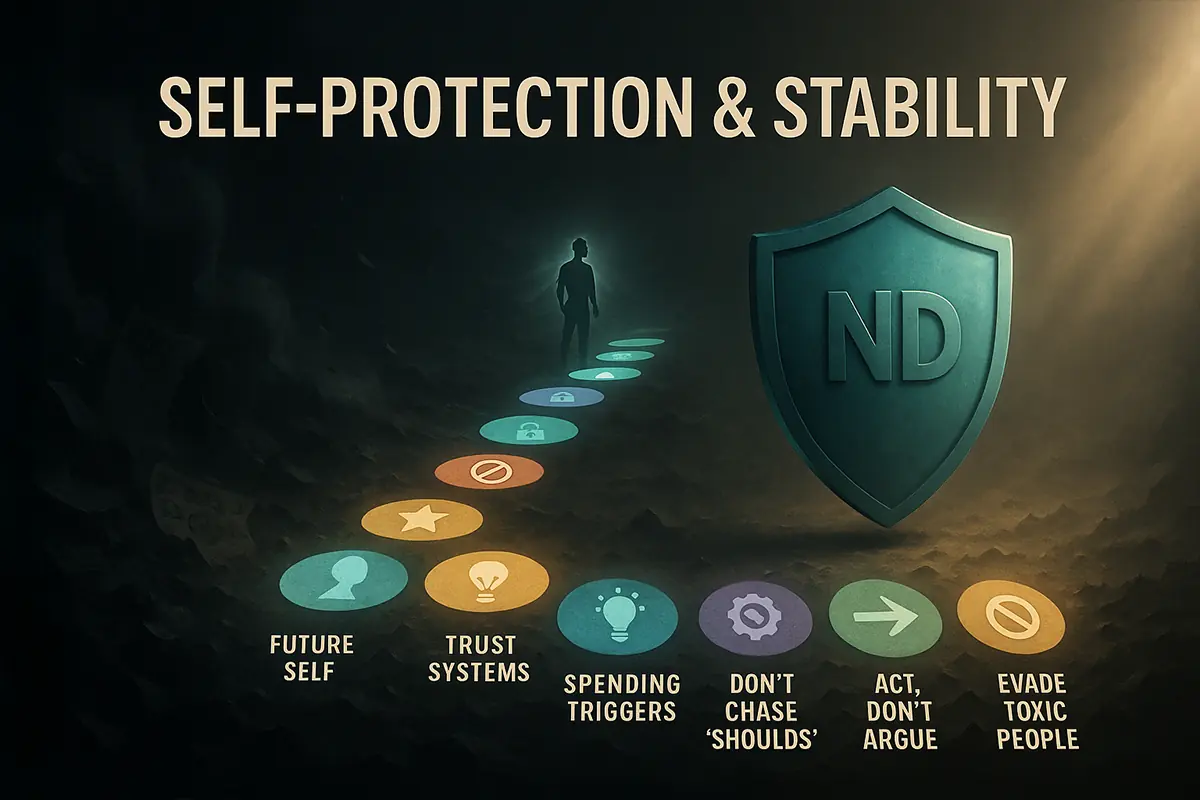The 48 Laws of Neurodivergent Finance
Adapted from Robert Greene’s classic, reimagined for money minds that don’t play by neurotypical rules.

Why Adapt the 48 Laws?
If you're not familiar, Robert Greene’s 48 Laws of Power was written as a field guide for surviving and thriving in competitive power structures — workplaces, courts, kingdoms, anywhere influence decides outcomes. Its strategies are sometimes ruthless, always pragmatic, and designed to help people navigate a world where raw talent isn’t enough.
But what happens when the “game of power” isn’t politics or monarchy, it’s your own financial survival? And what if the rules were never written for how your brain actually works?
Our Divergent Money adaptation translates Greene’s laws into a neurodivergent money context: not to manipulate others, but to protect your energy, work with your wiring, and navigate financial systems built for neurotypical assumptions.
These are adaptable strategies, tools to pull out when the world’s systems clash with your reality.
With that background out of the way, behold the 48 Laws of Neurodivergent Finance...
Self-Protection & Stability
In Greene’s book, the first cluster of laws is about survival: staying safe from those who hold more power, preserving your reputation, and avoiding unnecessary battles. In finance, the same principles apply: protect your future self, shield your reputation, and avoid the money traps that can spiral when you’re ND.

- Always Make Your Future Self Look Good → Automate bills so tomorrow-you doesn’t get wrecked.
- Never Trust Systems Completely → Apps glitch; double-check balances and due dates. Any person, app, or system that asks you to trust them completely is a red flag.
- Never Reveal Your Spending Triggers → Protect your dopamine leaks.
- Speak Less → Avoid financial oversharing that creates pressure.
- Protect Your Credit Reputation → That score opens or closes doors.
- Seek Attention, Stand Out → Use your ND story for scholarships, grants, or accommodations.
- Claim Credit for Your Wins → Track and celebrate every savings and debt milestone.
- Don’t Chase “Shoulds” → Build a money system that fits your brain, not theirs.
- Act, Don’t Argue → Pay the fee, automate it, move on.
- Evade Financially Toxic People → Limit exposure to those who sabotage your goals.
Tools & Tactics
Greene emphasized tools of strategy — deception, scarcity, calculated honesty. In finance, these translate to tactical moves: knowing when to negotiate, when to conceal, when to frame things for others, and when to play the long game.

- Become Indispensable → Build ND-proof skills that protect income.
- Use Honesty Strategically → Share ND context only when it helps ... landlord, HR (but this is a debated issue), bank.
- Highlight “What’s In It for Them” → Negotiating? Frame it in their language.
- Act Friendly to Gather Intel → Ask peers about raises, bills, side hustles.
- Destroy Debt Completely → Don’t dabble; knock it out in chunks.
- Increase Value Through Scarcity → Freeze cards, use cash jars, hide your own spending supply.
- Remain Unpredictable → Occasionally surprise yourself with an auto-savings hack.
- Avoid Isolating Yourself → Money buddies, ND groups, safe accountability.
- Don’t Offend the Wrong Entity → IRS, landlord, loan servicer — stay compliant.
- Keep Options Open → Multiple income streams = financial resilience.
Dopamine, Energy & Motivation
Greene’s middle laws often focused on spectacle, reputation, and momentum— using psychology to maintain an edge. For neurodivergent money management, the “spectacle” isn’t about dazzling others, it’s about keeping your own motivation alive. These laws protect your limited energy and harness dopamine in your favor.

- Play Dumb → Let apps do the math.
- Use Surrender as a Tool → Sometimes canceling isn’t worth the executive function cost.
- Focus Your Efforts → One financial quest at a time.
- Be Subtle and Discreet → Keep goals quiet if outside pressure derails you.
- Constantly Reinvent Your System → Your brain changes; so should your money tools.
- Maintain a Spotless Reputation → Pay housing and credit first.
- Exploit the Desire for Belief → Vision boards, gamified trackers, reward charts.
- Move Decisively → When dopamine hits, set the autopay now.
- Anticipate Obstacles → Oops fund = protection against ND slip-ups.
- Make Success Look Easy → You don’t have to show the scaffolding.
Strategy & Long Game
Later in Greene’s framework, the laws shift toward patience, long-term positioning, and controlling narratives. In neurodivergent finance, this is where we zoom out: big-picture systems, curating our environment, and setting ourselves up for resilience over decades.

- Limit Choices → Pre-decide categories to reduce paralysis.
- Cater to Your Own Delusions → If stickers or tokens motivate you, use them.
- Identify Weak Spots → Know your impulsive spending categories.
- Carry Yourself Like a King → Ask for accommodations without apology.
- Time Actions Perfectly → Align bill pay with payday. Call banks when reps are fresh.
- Ignore What You Can’t Have → Curate your feed; stop doomscrolling luxury TikTok.
- Stage Dramatic Events → Debt-shredding parties, savings jar rituals.
- Think Independently, Act Conformingly → Hack NT systems quietly.
- Create Chaos to Gain Advantage → Use windfalls (bonus, refund) to leapfrog goals.
- Beware Free Gifts → BNPL isn’t free.
Advanced ND Power Plays
Greene ends with mastery laws: subtle, psychological, often paradoxical. In finance, this becomes the art of financial resilience: protecting yourself from comparison, leveraging community, and adapting endlessly.

- Avoid the Shadow of Greatness → Don’t compare to neurotypical “success porn.”
- Target Group Leaders → Join ND finance spaces for leverage.
- Appeal to Both Mind & Heart → Anchor money goals in numbers and emotions.
- Disorient with Imitation → Default scripts like, “I’ll think about it.”
- Implement Change Gradually → Don’t budget-overhaul in one day.
- Show Imperfections → Vulnerability is a power move; ask for help.
- Recognize the Finish Line → Celebrate milestones; don’t keep moving goalposts.
- Be Like Water → Adapt systems to your brain, not the other way around.
The Neurodivergent Mind
The financial system wasn’t built with neurodivergence in mind (although it was probably a spicy brain that came up with the idea for money!).
These 48 laws aren’t about playing their game perfectly — they’re about bending rules, protecting your energy, and creating a financial system that works with your brain, not against it.
Let us know what you agree with and what you might change! Sign up and comment below or find us on the socials.
Disclaimer: As ALWAYS, this article is for educational and motivational purposes and is not financial advice. Always consider consulting with a financial professional for guidance tailored to your unique situation.




